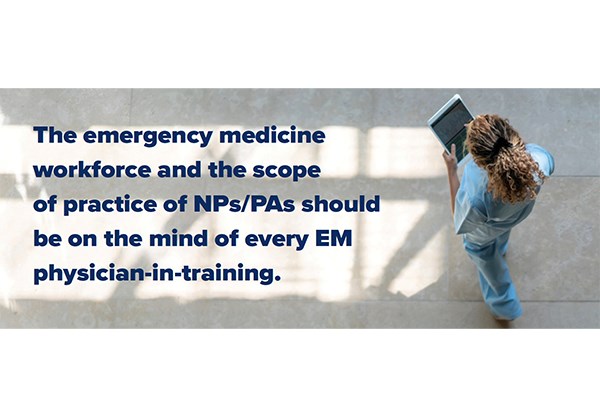Student Doctor Network. Reddit. Facebook. Twitter.
Seemingly every social media outlet used by emergency medicine physicians-in-training blew up on Feb. 22 in response to a proposed non-physician emergency medicine "residency" training program at UNC.1 The question is: Why?
There's a lot to unpack from this. While the timing was not ideal, only days before rank lists were due, the underlying issue for medical students is how non-physician post-graduate training programs will impact their residency training and post-residency employment opportunities. Medical students are becoming increasingly concerned about the implications for their future careers with attacks coming from so many different angles. With rapid expansion of residency programs, NPs and PAs pushing for independent practice nationwide, and legislation negatively affecting physician compensation, medical students are becoming increasingly tuned in as they recognize the impact of these important issues. Medical students feel that their efforts and future training are being devalued and taken for granted. If we don't protect the integrity of our training, what does that mean for our specialty and our patients?
The emergency medicine workforce and the scope of practice of NPs/PAs should be on the mind of every EM physician-in-training. EMRA firmly believes "the only pathway to independent practice in emergency medicine in the 21st century is the completion of an ACGME accredited emergency medicine residency training program and board certification by ABEM or AOBEM."2 EMRA has held this stance for nearly 30 years.
The question of post-graduate training for NPs/PAs is more complex. More than 40 post-graduate training programs for PAs already exist, including ones at UCSF Fresno, Yale, Cornell, and Carolinas.3 To protect resident training, the ACGME Common Program Requirements state:
- "The program's educational and clinical resources must be adequate to support the number of residents appointed to the program." (1.D.4.)
- "The presence of other learners and other care providers, including, but not limited to, residents from other programs, subspecialty fellows, and advanced practice providers, must enrich the appointed residents' education." (1.E.)
- "The program must report circumstances when the presence of other learners has interfered with the residents' education to the DIO and Graduate Medical Education Committee." (1.E.1.)4 To report, search "ACGME Report an Issue."
But despite these protections, the allocation of GME funding to residencies is at risk. In the U.S. Government Accountability Office's report, "Health Care Workforce: Views on Expanding Medicare GME funds to NPs and PAs," some members of Congress suggest that prioritizing funding for NPs/PAs may "mitigate the effects of a physician shortage."5,6 At a time when rates of medical student graduates are increasing faster than rates of new GME spots, expanding funding to NP/PA training does not make sense. This is why All EM Resident Organization and Students (AEROS) wrote a joint statement opposing such.7
Is the specialized training for NPs/PAs working in emergency departments better for patient care? Or do the increased hours of specialized training blur the lines between board certified emergency physicians and non-physician providers? The waters are muddy.
Here is what is clear: The Emergency Medicine Residents' Association is the voice of emergency medicine physicians-in-training and the future of our specialty. Together, our voices have the power to make change. Your EMRA Board of Directors will be taking resolutions to the AMA and ACEP Council to protect the use of the word "resident" by limiting its use to physicians-in-training only.
Make your voice heard. Share your opinion through EMRA"s Representative Council (RepCo), a democratic process where more than 16,000 members" views are collectively turned into policy and affect real change.
References
- Correction of misinformation online regarding APPs. UNC School of Medicine. Available at: https://www.med.unc.edu/emergmed/correction-of-misinformation-online-regarding-apps/.
- EMRA Policy Compendium. EMRA. Available at: https://www.emra.org/siteassets/emra/about-emra/governing-docs/policycompendium.pdf.
- Postgraduate Programs. SEMPA. Available at: https://www.sempa.org/education/postgraduate-programs/.
- ACGME Program Requirements for Graduate Medical Education in Emergency Medicine. ACGME. Available at: https://www.acgme.org/Portals/0/PFAssets/ProgramRequirements/110_EmergencyMedicine_2019.pdf?ver=2019-06-25-082649-063.
- Views on Expanding Medicare Graduate Medical Education Funding to Nurse Practitioners and Physician Assistants. United States Government Accountability Office. Available at: https://www.gao.gov/assets/710/703372.pdf.
- GAO Report Released on Expanding Medicare GME Funding to NPs and PAs. AAMC. Available at: https://www.aamc.org/advocacy-policy/washington-highlights/gao-report-released-expanding-medicare-gme-funding-nps-and-pas?utm_source=share&utm_medium=ios_app&utm_name=iossmf&fbclid=IwAR1fm80CqTbqSravyTBhF8vz4lMJfxo1wTJJ_FMDy-S_O-lpgje5Ynrxx0Y.
- Aintablian H, Stahl G, Jasani G, et al. Joint Statement Opposing Expanding Graduate Medical Education Funding to Nurse Practitioners and Physician Assistants. Available at: https://docs.google.com/document/d/1cVWtpubFJ9KevMaqj3FS-0ykoLMH6Iaim9jLv0p4Pow/edit.



